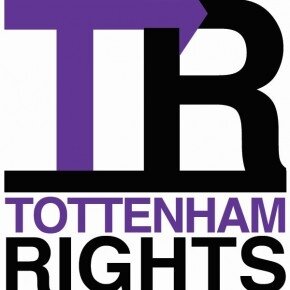About Tottenham Rights
Tottenham’s black community has a unique history of challenging racial and policing oppression spanning over at least three decades. Last year’s August violent public disturbances in the locality, sparked by the police shooting of black youth Mark Duggan, are only the latest events underlying a litany of state neglect (poverty) and enforcement policies, such as stop & search, targeting black youth. It is clear that the events of last August occurred as a result of the local Black community feeling disempowered and marginalised from the mainstream.
In addition to this the lack of representation meant that the community felt compelled to seek answers for themselves. In so doing they were treated with dismissive contempt by those in authority. In the public meetings and various reviews that took place in the immediate aftermath of the riotslocal community members cited this kind of response to their concerns as being the norm, as such it clearly helped to create an atmosphere where the frustrations and anger, of those whose voices are seldom listened to, erupted with such devastating consequences for us all.
Although some of the root causes of the confrontations remain the same, the political & social landspace and the nature of racism has been transformed over the last three decades. The most dramatic has been the transformation of the community. During the 1990s, the predictability of post-colonial and post-independence migration patterns to the UK from South Asia, the Caribbean, West Africa and Hong Kong changed irrevocably as new movements of people (from over a hundred countries) took place. While this transformed the metropolitan urban landspace, it also changed what were assumed to be relatively ‘fixed’ minority communities. Alongside, new and enduring global associations were created within communities, many often taking an explicitly political, religious or communal form.
Tottenham Rights has been established to meet the old and new challenges for those settled in the area. In particular, we aim to :
a) Challenge all forms racism (institutional and violent) by providing advice and advocacy service to victims and to hold insitutions to account by developing public interest campaigning where specific cases through campaigning can lead to positive changes in legislation, policy and practices
b) Develop a community empowerment programme through information sharing, by holdng public & educational events and campaigning for geater local public inclusion, representation, transparency and accountability
c) Build new community and social alliances. Alliance-building has existed as a traditional model of anti-racist work for several decades. However, with the dramatic rise of new media and the creative potential of other political techniques, traditional forms of political alliance-building and related activities need reinvigorating and thinking afresh in different ways. In a period where equalities, anti-discrimination and human rights work has come under sustained attack, new ways of conceiving anti-racist alliances and anti-racist politics, and linking domestic and transnational issues need to be developed..
The origins of Tottenham Rights go back to the 1980s with the Broadwater Farm Defence Campaign. The Broadwater Farm Defence Campaign was set up to address the wider issues of injustice and police-community relations, following the mass arrest of 369 people during the Broadwater Farm Estate disturbances on Oct 6th 1985.
This work has continued and Tottenham Rights was launched Monday 8 October 2012 as project on the anti-racist charity, The Monitoring Group. Since then it was grown in strength and is now an independent organisation run and managed by local people from Tottenham.
.
On 5 October 1985 four policemen burst into the home of Broadwater Farm resident Cynthia Jarrett looking for stolen property. They failed to find any, but Ms Jarrett had a heart attack and died. Her death was only weeks after riots in Brixton, south London, which happened following the accidental shooting of Cherry Groce by police officers. In October 2015, Ithe Monitoring Group and Tottenham Rights organized an event titled ‘Broadwater Farm Revisited – Nicky Jacobs is innocent’.




